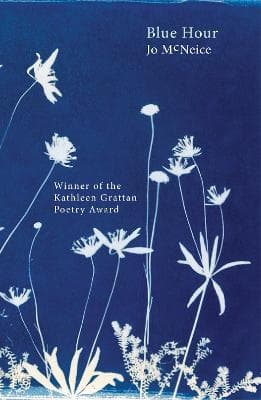Review: Blue Hour, by Jo McNiece
Reviewed by Sophie van Waardenberg
Jo McNeice’s debut collection, Blue Hour, covers a lot of ground. There’s romance, the dissolution of at least one relationship, a reckoning with mental illness, forays into the worlds of myth and movie, and odes to the natural world. It’s serious but not staid, playful but not twee; it’s by turns lavish and clipped, often ushering the reader into a room that might feel familiar, then switching off the light and letting unease creep in.
In Blue Hour is a story of a life (more accurately, a large chunk of a life) that has demanded to be told and told again, worked out, played with, carved up. The collection’s cover echoes, or preempts, its insides: it bears a photographic negative of a shock of wildflowers, imprinted as an image is on your retina if you’ve stared at it for too long. In their tendency towards collecting and clutching onto fragments of memory and place — a wasp killed by a jandal, a yellow corridor — these poems have that same imprinted quality.
In Blue Hour, the landscape is frequently personified. It has its own attitude, its own whims, and the speaker’s relationship with it is a tender one. In the opening poem, ‘Aro Valley’, the speaker observes and converses with her surroundings as if with a close friend:
The weeds tripping up
the fences, the flowers
tripping up the weeds.
The night about to settle
in for the night.
But pausing before
it closes the door.
Relax. I think you look
just wonderful.
I imagine you can tell
I want to take your picture.
The speaker in many of these poems is almost desperate to grasp onto moments of togetherness with a loved one, or a once-was-loved one, though they are always fleeting. That reaching creates a bittersweetness that remains on the tongue from the opening of the collection through to its final, titular poem, which ends like this:
Let us capture something
before the impenetrable
blackness.
Many of the poems here use received forms, including three takes on the glosa (which involves a line of an existing work to conclude each newly composed stanza). McNeice borrows lines from P.K. Page, Delmore Schwartz and Theodore Roethke, weaving them securely into the fabric of her own poems through rhyme. Inviting those other poets in, and playing with the space that opens up between their voices and this poet’s, prompts new tonal possibilities. In ‘Going where I have to go’, for example, McNeice’s ‘spindles of fear’ and ‘itchy noise’ are anchored by Roethke’s gentle, perhaps even tautological insistences, in iambic pentameter:
My head is being knick-knacked.
Voices, dark blue, slip in & out
corrupting what I really know.
I’ve looked skyward so long colours start to run.
I learn by going where I have to go.
McNeice is as strong in long-form narrative as she is in brief, single-strophe pieces, and the variety is a pleasure to roam through. There are a few moments in Blue Hour when overfamiliar, broad-stroke images briefly bog a poem down, as in ‘Although I have never met you, you have shipwrecked my heart’, which ends with ‘drowning sailors / burning masts, desperation & desire’. But those moments are fleeting in a book packed with fresh diction and jarring proclamations. In the same poem, I was caught brilliantly off-guard by a strident, straightforward simile: ‘a southerly that came racing in, like a manic episode.’
When Blue Hour was awarded the Kathleen Grattan Poetry Award in 2023, judge Anne Kennedy commented that each time she read the collection, she ‘discovered more, was surprised more’. I wholly agree. This is a book that reveals more luminous beauty with each additional reading, offering new connections from image to image, poem to poem, drawing its reader ever deeper.
Reviewed by Sophie van Waardenberg
